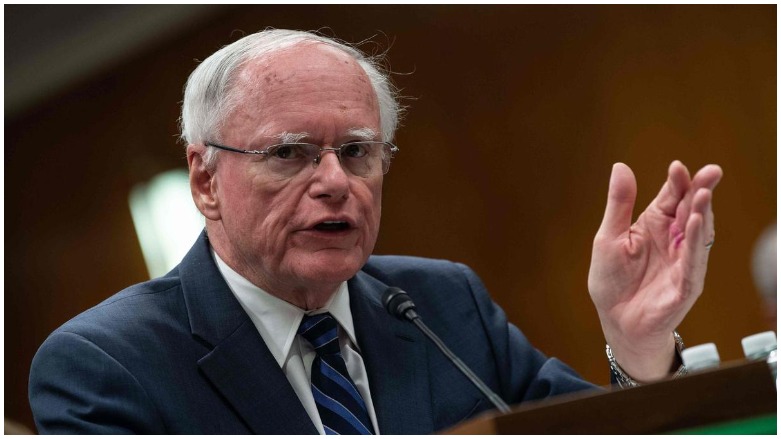James Jeffrey stepping down, to be replaced by Nathan Sales and Joel Rayburn

WASHINGTON DC (Kurdistan 24) – Secretary of State Mike Pompeo announced on Monday that Amb. James Jeffrey was stepping down from the two positions that he held under Pompeo’s tenure: Special Representative for Syria Engagement and Special Envoy for the Global Coalition to Defeat ISIS.
Jeffrey previously served as Deputy National Security Adviser under President George W. Bush from 2007 to 2008, before becoming ambassador to Turkey (2008 to 2010) and then ambassador to Iraq (2010 to 2012.)
“In August 2018,” Jeffrey “came out of retirement at my request,” Pompeo explained in a written statement, “to serve as my point person on Syria.” In that capacity, Jeffrey was responsible for US diplomacy aimed at isolating the Syrian regime and pressing it into compliance with UN Security Council Resolution 2254.
That resolution was passed in December 2015. It calls for a ceasefire between the Syrian regime and Syrian opposition to be followed by free and fair elections to pave the way for a political transition.
However, Russia’s intervention that year has changed a lot in Syria. It once appeared that the Assad regime might well collapse, but that appears unlikely now, and little progress has been made in implementing the resolution.
In January 2019, Jeffrey also assumed the position of Special Envoy for the Global Coalition to Defeat ISIS, after Brett McGurk left that post, following the resignation of Secretary of Defense Jim Mattis.
Mattis had clashed with President Donald Trump over a replacement for Gen. Joseph Dunford as Chairman of the Joint Chiefs of Staff, after Dunford’s term ended. However, the final straw for Mattis was Trump’s decision to withdraw US forces from Syria (later reversed in substantial part.)
Nathan Sales, currently the State Department Coordinator for Counterterrorism, will assume Jeffrey’s position as Special Envoy to the Defeat-ISIS Coalition. Sales’ background is as a lawyer, and he has held various distinguished positions in the legal field.
Sales’ official resume, for example, notes that during the administration of George W. Bush, he helped draft the “USA Patriot Act”—legislation passed after the September 11, 2001, attacks on New York and Washington to enable law enforcement to fight terrorism more effectively. For that work, he received the Attorney General’s Award for Exceptional Service.
However, nothing in Sales’ resume suggests that he has lived in the Middle East or studied the region in any depth, and it raises the question as to whether he really understands a threat like ISIS—widely, but wrongly, seen by Americans as little more substantial than an ideology resident on the internet.
The question of the competition among local groups over power and resources as a factor in ISIS’ violence is, thus, regularly neglected by those who see little beyond extreme religious belief as the key factor behind such terrorism.
Joel Rayburn, however, has much more experience in the region and a far more nuanced perspective on its politics.
Rayburn was Jeffrey’s deputy in his capacity as Special Envoy for Syrian Engagement. Before assuming that position, he worked on Trump’s National Security Council staff as Senior Director for Iran, Iraq, Syria, and Lebanon.
Rayburn is also a retired US Army officer. He edited and co-authored the Army’s history of that conflict, The US Army in the Iraq War. Unlike many Americans who maintain that a “secular” figure, like Saddam Hussein, could not work with religious extremists, like Osama bin Ladin, Rayburn detailed Saddam’s Faith Campaign of the 1990s in another work—Iraq After America: Strongmen, Sectarians, Resistance.
“To lead this Faith Campaign, Saddam appointed is second-in-command, Izzat Ibrahim al-Douri,” Rayburn noted, as Saddam adopted “an Islamic veneer to his secular regime.”
In that respect, Rayburn’s understanding resembles that of senior Kurdish officials, like the late Dr. Najmaldin Karim, Governor of Kirkuk Province until Baghdad’s assault on the disputed territories in October 2017, in a military operation organized by Qasim Soleimani, head of the Qods Force of Iran’s Islamic Revolutionary Guard Corps, who was later assassinated by US forces.
In an interview with Kurdistan 24 in 2018, Karim, who was careful to stick with what he knew well, explained that in Kirkuk, ISIS was a local phenomenon, much as described by Rayburn, writing about an earlier phase of Iraq’s Sunni Arab insurgency.
ISIS in Kirkuk did not consist of foreigners, but people from the province, Karim stated.
“Peshmerga fought ISIS bravely, and hundreds of them were killed,” he explained. “We have their pictures, their DNA. They’re all from the area.”
“What was called the liberation of Hawija,” Karim continued, “was basically these people shaved, threw the dishdasha, threw their things, went to their homes, and now they’re being reactivated and are active again.”
Editing by John J. Catherine
